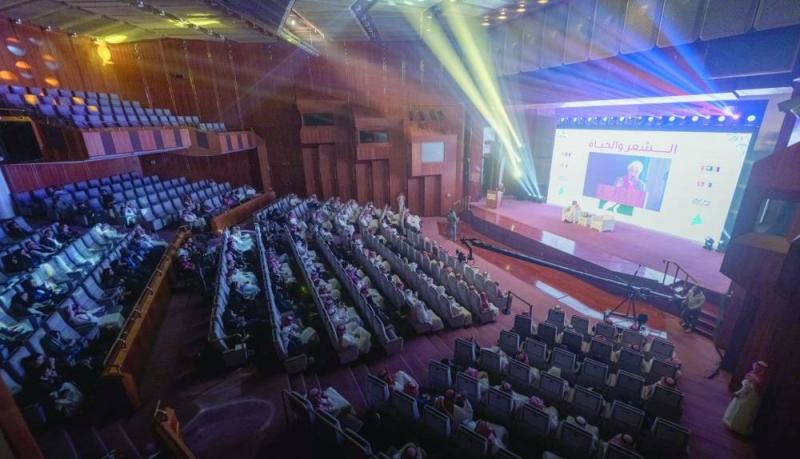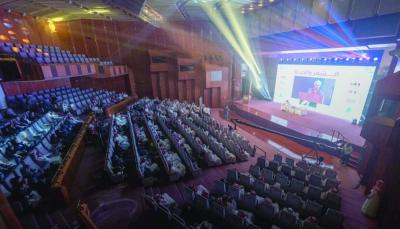Syrian poet Adonis revealed that the era referred to as the Renaissance is a misnomer and that, ultimately, it was merely a revival of an ancient Arabic literary experience or a borrowing from a new Ottoman context. He stated that Arab creativity, both poetically and intellectually, can only be achieved through a complete break from revival and imitation, considering poetry and art as gateways to new horizons in the relationships between words and things, and between humans and the world, thereby deepening this break and paving the way toward another era of Arab creativity.
During a lecture titled "Poetry and Life," which was his first in Saudi Arabia—where he is visiting on the occasion of the Saudi Ministry of Culture's celebration of the Year of Arabic Poetry 2023—Adonis expressed gratitude to the Ministry of Culture and the Academy of Arabic Poetry for the invitation. He said, "It has allowed me to be among you, you who view your country as an artistic work, transforming it into poems, statues, music, and architecture, enhancing the beauty of life. It is a moment that brings us all together on multiple levels and horizons."
Adonis spoke during the lecture held days ago in Riyadh, attended by a large audience of Saudi and Arab intellectuals, about his early moments in life and poetry. He mentioned that his natural and literary childhood was near the place where the alphabet was invented, in a clay house reminiscent of the first human clay. At the age of sixteen, he experienced school after having his father as his only teacher, where he learned the Quran, memorized much of it, and learned calligraphy and poetry. He lived alongside poets of the Arabian Peninsula in various assemblies and places in Hijaz, Taif, Najd, Medina, and Mecca.
He indicated that the land he was born on is the land of poetry and language, the Arabian Peninsula, which he regarded as among the great homelands of unique, magnificent poetry worldwide. He added, "In this horizon, I say that my relationship with this good land, the Arabian Peninsula, is not limited by language or poetry; rather, it is a vital relationship at the level of existence, filled alongside its sisters in the region with great human and cognitive civilizational mysteries yet to be discovered, with the 'Al-Ula region' at the heart of this vertical continent."
Adonis stated that the steps taken by some Arab creators throughout their lives, beginning with what has been mistakenly designated the Renaissance, continuing through the 1950s and beyond, are essential steps in opening new horizons in Arabic poetic writing and establishing new modes of expression. However, he noted that the culture of masculinity and the prevailing culture, with its traditions, trenches, and horizons, continued to track and affirm recurrent patterns. He emphasized that what was called the Renaissance ultimately amounted to a revival on one hand and borrowing on the other.
He pointed out that the traditional cultural structure unifies both the right and the left in practice, which is a phenomenon that specialists should study and analyze meticulously. He added, "From the point of revival, if Shawqi, dubbed the Prince of Poets, were to be placed on the same table with the poets he revived, such as Al-Buhturi, Abu Tammam, Al-Mutanabbi, and Al-Sharif Al-Razi, his position would be negligible because he added nothing new on any level; rather, he revived the form in high language. If I were to compare, I would align with Salah Jahin rather than Shawqi."
He continued, "From the left, if we discuss the poetic language of Muhammad Mahdi Al-Jawahiri, called the greatest poet of the Arabs, we would find that Al-Jawahiri revived ancient Arabic rhetoric, the rhetoric of praise and satire, and clothed it in a left-leaning form. When comparing him to poet Muzaffar Al-Nawab, I would be inclined towards Al-Nawab."
Regarding imitation, Adonis said, "You all know that once Arabs became acquainted with the West, they exited the old Ottoman Empire and entered a new Ottoman context, with the West succeeding in producing Arabs culturally in its machinery," urging a departure from revival and repetition and from the technical imitation that transformed Arabs into mere markets and consumers. Adonis asserted that current creativity in the Arab world cannot be achieved poetically and intellectually without a complete break from revival and imitation, considering poetry and art as innovating new horizons in the relationships between words and things, and between humans and the world, intensifying this break and steering it toward the foundation of another Arab creative era, in which the body is indebted to poetry, its books, music, expressive methods, and dimensions. He urged the creative poet to travel within the bodies of others, revealing, reading, and narrating, instead of roaming in the minds of poets and thinkers and reading what they think and write about.




